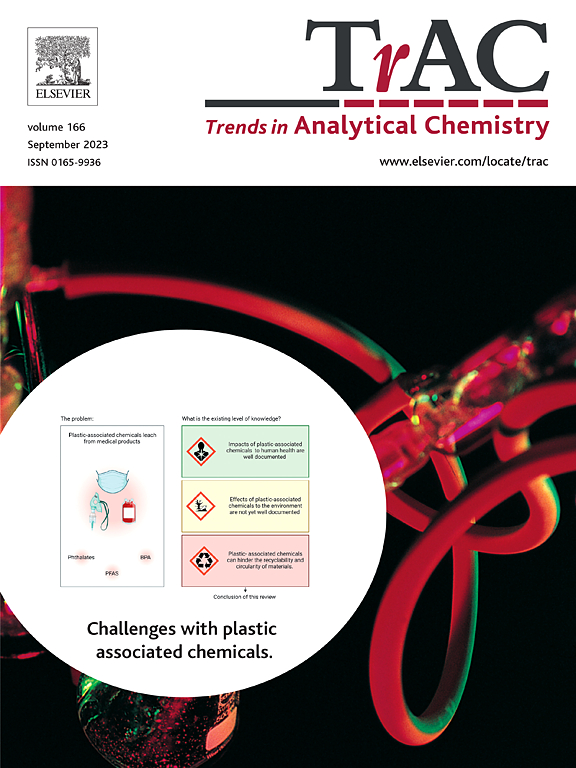基于纳米材料的海洋生物毒素快速检测先进传感器:一种道德和有前途的替代方案
IF 11.8
1区 化学
Q1 CHEMISTRY, ANALYTICAL
引用次数: 0
摘要
海洋毒素是由有害藻华产生的天然化学物质,它们通过代谢过程产生有毒物质。这些毒素可能积聚在各种海洋物种中,如鱼、蟹或滤食性双壳类。一些海洋毒素的毒性足以将它们归类为神经毒素和/或中毒毒素。不幸的是,海洋毒素检测的标准化方法仍然以复杂、昂贵和相当不道德的方式进行。基于纳米材料的生物传感器除了具有足够的灵敏度和选择性外,还可以作为一种快速实用的替代海洋毒素检测方法。我们介绍了最先进的研究,以设计各种平台,有望为海洋毒素检测提供新的标准,这些平台描述了海洋生物毒素纳米生物传感器的基本原理和需求。这篇综述将最终为海洋生物毒素检测的主要挑战提供一个关键的观点和见解,这些挑战必须克服,才能使这些系统对社会产生真正的影响。本文章由计算机程序翻译,如有差异,请以英文原文为准。

Nanomaterial-based advanced sensors for rapid marine biotoxin detection: An ethical and promising alternative
Marine toxins are naturally occurring chemicals produced by harmful algal blooms, which produce toxic substances through their metabolic processes. These toxins may accumulate in various marine species such as fish, crabs, or filter-feeding bivalves. Some marine toxins are poisonous enough to classify them as neurotoxins and/or poisoning toxins. Unfortunately, the standardized method for marine toxin detection is still conducted in complicated, expensive, and rather unethical ways. Nanomaterial-based biosensors can serve as a promising alternative detection for marine toxins as rapid and practical, in addition to having adequate sensitivity and selectivity. We present the most advanced studies to engineer various platforms promising new standards for marine toxin detection, which describe the fundamentals and the need for nanobiosensors for marine biotoxins. This review will conclusively provide a critical perspective and insights into the major challenges for marine biotoxin detections that must be overcome for these systems to have real impacts on society.
求助全文
通过发布文献求助,成功后即可免费获取论文全文。
去求助
来源期刊

Trends in Analytical Chemistry
化学-分析化学
CiteScore
20.00
自引率
4.60%
发文量
257
审稿时长
3.4 months
期刊介绍:
TrAC publishes succinct and critical overviews of recent advancements in analytical chemistry, designed to assist analytical chemists and other users of analytical techniques. These reviews offer excellent, up-to-date, and timely coverage of various topics within analytical chemistry. Encompassing areas such as analytical instrumentation, biomedical analysis, biomolecular analysis, biosensors, chemical analysis, chemometrics, clinical chemistry, drug discovery, environmental analysis and monitoring, food analysis, forensic science, laboratory automation, materials science, metabolomics, pesticide-residue analysis, pharmaceutical analysis, proteomics, surface science, and water analysis and monitoring, these critical reviews provide comprehensive insights for practitioners in the field.
 求助内容:
求助内容: 应助结果提醒方式:
应助结果提醒方式:


